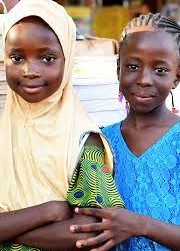Health
SCI’s intervention reduced early marriage, early childbearing in Nigeria -Minister

The Minister of Health, Dr Osagie Ehanire, has commended Save The Children International (SCI) for its intervention in adolescent challenges in Nigeria by reducing child marriage, and early childbearing, among others.
Ehanire, represented by Dr Salma Anas, Director, Family Health, gave the commendation at the Reaching and Empowering Adolescents to make Informed Choices for Their Health in Nigeria (REACH) close out event organised by SCI in Abuja.
The News Agency of Nigeria (NAN) reports that the REACH project is targeted at 100,000 married and unmarried female and male adolescents between the ages of 10 to 19 years in six local government areas in Gombe, Katsina and Zamfara States.
Ehanire said that SCI Nigeria through the REACH project had in no little way contributed its quota to the growth and development as well as the general well-being of Nigerian adolescents and young people especially the girl-child.
“Examples of such achievements include the age of marriage, capacities of health workers and facilities delivering gender-responsive adolescent-friendly services.
“The Federal Ministry of Health, through the Department of Family Health in collaboration with SCI, with funding support from Global Affairs Canada (GAC) implemented a three-year REACH project in Gombe, Katsina and Zamfara States.
“The aim of the intervention is to improve young people’s access to gender-responsive quality sexual and reproductive health services and rights, in 300 communities across six LGAs.
“This is fully in line with our vision and priorities of improving access to quality health care, leaving no one behind.
“There is no doubt that the project has within these three and half years achieved the set objectives in affecting young women and girls positively, in the following areas:
“They are child marriage, early childbearing, educational attainment, gender-based violence, decisions ability and access/utilisation of services and improved sexual and reproductive health and rights (SRHR) knowledge,” he said
Ehanire said that the Ministry had put in place, sustainability plan to ensure that the achievements were sustained through facilitating the domestication of the policy documents at sub-national levels and strengthening the leadership of the technical working groups.
SCI, Acting Country Director, Shannon Ward, said that the REACH review findings indicated significant attributable progress as opinions and perceptions of adolescents on sexual health issues changed positively.
“For example, two out of five unmarried adolescent girls, 42 per cent up from 11 per cent baseline, reported holding opinions consistent with independent decision-making about their sexual and reproductive health.
“That proportion is 52 per cent among married girls up from 25 per cent at baseline.
“The proportion of married adolescents, who think that couples should jointly decide about how many children to have and when, increased from 62 per cent at baseline, to 94 per cent at midline.
“Similarly, the proportion of adolescents, who think that women have no right to participate in household financial decisions, fell from 49 per cent at baseline to 33 per cent at midline.”
Ward said that in the face of a myriad of systemic and structural limiting social norms including gender norms, the above stated progress was heartwarming.
She said that it was an indicative of the change that could come about with sustained collaboration, engagement and interventions at all levels, particularly gender-transformative programming that was in alignment with community needs.
She added that the project worked hard in resuscitating and building the capacity of the children’s parliament, supporting the children’s parliament to advocate for the passage of the child rights act.
REACH Programme Director, Rahinatu Hussaini said that the project targeted adolescents because they face considerable sexual and reproductive health risks.
Hussaini said that early and unintended pregnancy affected the lives of millions of adolescents across Nigeria, as 11.6per cent of girls were married by age 15 and 49 per cent were married by 18, with wide regional disparities.
According to her, the average age of marriage in Zamfara, Gombe and Katsina is 14.5, 16 and 15 years respectively.
She added that the first sexual encounters for adolescent girls were often up to two years earlier in rural areas than in urban.
“Adolescent birth rate in Katsina is 249 per 1,000 births, few sexually active adolescents are using contraceptives.
“Adolescent girls in Nigeria face many gender-based barriers to seeking medical care, weak referral systems, and lack of poor response to SGBV are also issues,” she said.
Hussaini said that the intervention was carried out in Balanga and Dukku in Gombe, Rimi and Sandamu in Katsina and in Talata Mafara and Kaura Namoda in Zamfara.
She said that the aim and outcome was, improved the sexual and reproductive health of adolescent girls and boys aged 10-19 in Gombe, Katsina and Zamfara states in Nigeria.
Representatives of the state governments of the three states were in attendance including traditional rulers that pledged their continuous support to curb the menace listed above. (NAN)
Health
Millions of Children Experience Daily Domestic Violence in Schools, Homes Globally – WHO
Hundreds of millions of children and adolescents around the world face daily violence in their homes, schools, and elsewhere which could have lifelong consequences.The World Health Organisation (WHO) said this on Thursday.The violence includes being hit by family members, being bullied at school, as well as physical, emotional, and sexual violence, WHO said.
In most cases, violence occurs behind closed doors. More than half of those aged two to 17 or more than a billion minors in total experience violence each year according to the WHO. In three out of five children and adolescents, it is physical violence at home, with one in five girls and one in seven boys experiencing sexual violence.Between a quarter and half of minors are affected by bullying according to the information provided.Only half of the children reportedly talk about their experiences of violence and less than 10 per cent receive help.Lifelong consequences could include depression and anxiety disorders, or tobacco and drug use.As a result, many children do not reach their learning potential in school.Against the backdrop of being highly preventable, violence remains a horrific day-to-day reality for millions of children around the world leaving scars that span generations,” said Tedros Adhanom Ghebreyesus, WHO director general.The UN’s first conference on violence against children opened in Bogota, Columbia on Thursday.At the two-day conference, more than 100 countries pledged to find ways to better support overwhelmed parents and introduce school programmes against bullying and for healthy social behaviour.They also pledged to raise the minimum age for marriage.Some countries wish to generally ban children from being hit at school or home. (dpa/NAN)Health
WHO Identifies 17 Pathogens as Top Priorities for new Vaccine Development

The World Health Organisation (WHO) has listed 17 bacteria, viruses and parasites that regularly cause disease as top priorities for new vaccine development.WHO, in a study published on Tuesday, reconfirmed long-standing priorities for vaccine research and development (R&D), including for HIV, malaria, and tuberculosis – three diseases that collectively take nearly 2.
5 million lives yearly. The study is the first global effort to systematically prioritise endemic pathogens based on their regional and global health impact. Attention is also given to pathogens such as Group A streptococcus, which causes severe infections and contributes to 280,000 deaths from rheumatic heart disease, mainly in lower-income countries.Another new priority is Klebsiella pneumoniae — a bacteria that was associated with 790,000 deaths in 2019 and is responsible for 40 per cent of neonatal deaths due to blood infection (sepsis) in low-income countries.The new study supports the goal of ensuring that everyone, everywhere, can benefit from vaccines that protect against serious diseases.It aims to shift the focus in vaccine development away from commercial returns towards regional and global health needs, WHO’s Dr Mateusz Hasso-Agopsowicz, who works in vaccine research, said in a statement.He explained that in the past, vaccine R&D typically was influenced by profitability.“As a result, diseases that severely affect low-income regions received little attention.“We hope this represents a critical shift where we want to change the focus from commercial perspective profitability of new vaccines towards the actual health burden so that the new vaccine research and development is driven by health burden and not just commercial opportunities,” he said.To carry out the study, WHO asked international and regional experts what they think is important when prioritising pathogens for vaccines R&D.Criteria included deaths, disease and socioeconomic impact, or antimicrobial resistance.“We had asked experts that have expertise in pathogen epidemiology, clinicians, paediatricians, vaccine experts from all of the WHO regions, to ensure that the list and the results that we produce really reflect the needs of diverse populations worldwide,” Hasso-Agopsowicz said.Analysis of those preferences, combined with regional data for each pathogen, resulted in the top 10 priority pathogens for each of WHO’s six regions globally.The regional lists were then consolidated to form the global list, resulting in the 17 priority endemic pathogens for which new vaccines are urgently needed.To advance vaccine R&D, WHO has categorised each pathogen based on the stage of vaccine development and the technical challenges involved in creating effective vaccines.Hasso-Agopsowicz said the study is expected to guide future vaccine R&D investments, including funders, researchers and vaccine developers, and also policymakers as they “can decide whether to introduce these vaccines into immunisation programmes.” (NAN)Health
UCH JOHESU Suspends Strike

The Joint Health Sector Unions (JOHESU), University College Hospital (UCH), Ibadan,has suspended the strike it embarked on Oct. 25.The workers resumed work on Friday morning.The seven-day nationwide warning industrial action embarked upon by the unions was to press home their demands ofadjustment of Consolidated Health Salary Structure as was done with the Consolidated Medical Salary Structure sinceJan.
2, 2014 and implementation of consultant cadre for pharmacists in federal health institutions. Others are upward review in the retirement age from 60 to 65 years for health workers and 70 years for consultants, andpayment of outstanding salaries of JOHESU members in professional regulatory councils.The UCH JOHESU Chairman, Mr Oladayo Olabampe, said that the strike was suspended as directed by the national body.He explained that “the suspension followed an MoU signed between JOHESU national leadership and Federal Government.“The Federal Government asked for a maximum of six weeks counting from Oct. 31, to meet our demands.“Based on the MoU signed, the JOHESU National Executive Council met and resolved that the strike be suspended on Fridaynationwide.”According to him, JOHESU UCH is obeying the order, and workers have resumed work.Olabampe said that if the demands were not met after the six weeks, they would embark on an indefinite strike. (NAN)
























